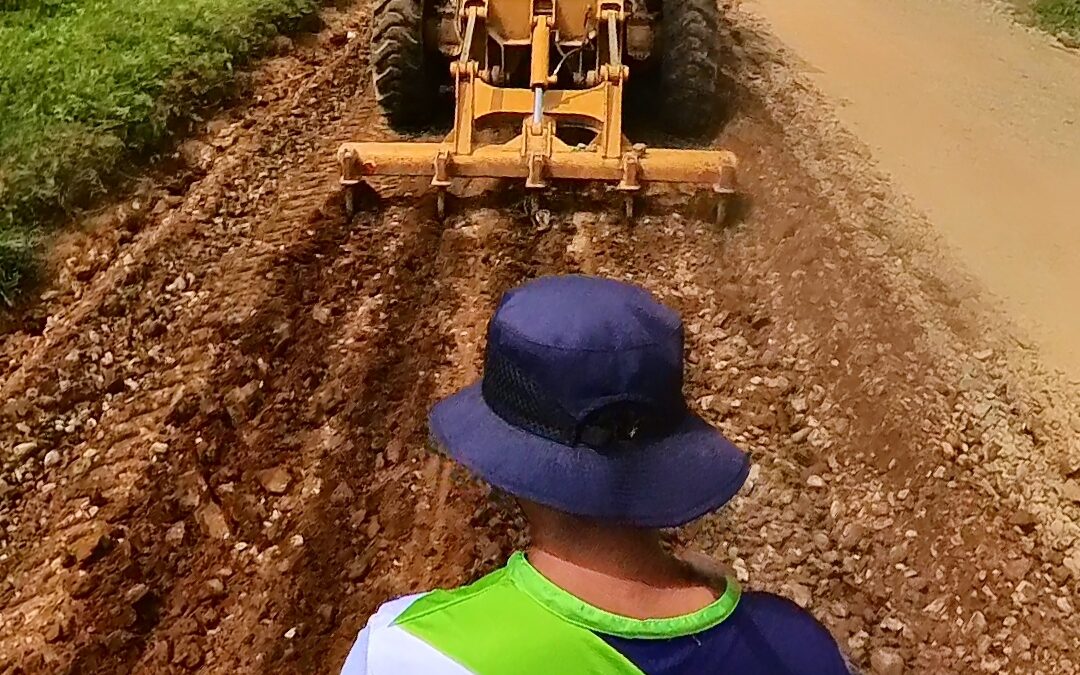In road construction, a soil stabilizer refers to any substance or technique used to improve the properties of the soil beneath a road surface, thereby enhancing its strength, durability, and overall performance. Soil stabilizers can be chemical additives, such as lime, cement, or asphalt emulsions, which are mixed with the soil to alter its properties and increase its load-bearing capacity. Mechanical stabilization techniques, such as compaction or reinforcement with geosynthetics, are also common methods employed to enhance soil stability. By stabilizing the soil, these methods help prevent settlement, reduce erosion, and improve the longevity of roads, ultimately resulting in safer and more cost-effective infrastructure.
The use of Soil Stabilizers in the Philippines
 The use of soil stabilizers in the Philippines holds significant promise for addressing infrastructure challenges prevalent in the country. With its diverse terrain and frequent exposure to natural hazards like typhoons and earthquakes, the Philippines often grapples with issues such as potholes, poor road conditions, and high maintenance costs. Introducing soil stabilizers into road construction projects across the archipelago could offer a sustainable solution. By treating the native soil with stabilizing agents, engineers can enhance soil strength and stability, improving road durability and reducing maintenance requirements. This approach not only extends the lifespan of roads but also enhances their resilience to environmental factors. Moreover, the use of soil stabilizers can potentially lower construction costs by utilizing locally available materials more effectively. As the Philippines continues to prioritize infrastructure development to support economic growth and ensure connectivity across its islands, integrating soil stabilizers into road construction practices could prove instrumental in achieving these goals while fostering sustainable development.
The use of soil stabilizers in the Philippines holds significant promise for addressing infrastructure challenges prevalent in the country. With its diverse terrain and frequent exposure to natural hazards like typhoons and earthquakes, the Philippines often grapples with issues such as potholes, poor road conditions, and high maintenance costs. Introducing soil stabilizers into road construction projects across the archipelago could offer a sustainable solution. By treating the native soil with stabilizing agents, engineers can enhance soil strength and stability, improving road durability and reducing maintenance requirements. This approach not only extends the lifespan of roads but also enhances their resilience to environmental factors. Moreover, the use of soil stabilizers can potentially lower construction costs by utilizing locally available materials more effectively. As the Philippines continues to prioritize infrastructure development to support economic growth and ensure connectivity across its islands, integrating soil stabilizers into road construction practices could prove instrumental in achieving these goals while fostering sustainable development.
Eco-Friendly Soil Stabilizer: Revolutionizing Road Construction and the Impact of RT20
Eco-friendly soil stabilizers play a crucial role in helping companies along their journey to ESG (Environmental, Social, and Governance) compliance by aligning with their sustainability goals and practices. Firstly, stabilizers like RT20 contribute to the environmental aspect of ESG compliance by reducing carbon emissions and minimizing ecological impact through their use of renewable resources and water-based nanotechnology. This aligns with the ‘E’ in ESG, which focuses on environmental sustainability. Secondly, by prioritizing sustainability and minimizing the release of harmful pollutants into the environment, eco soil stabilizers also address the ‘S’ (Social) aspect of ESG compliance, as they promote community well-being and health. Finally, in terms of ‘G’ (Governance), utilizing eco-friendly soil stabilizers demonstrates a commitment to responsible corporate governance by investing in sustainable practices and technologies, thereby enhancing corporate reputation and credibility. Overall, the adoption of eco-friendly soil stabilizers helps companies move closer to ESG compliance by addressing key environmental, social, and governance factors in their operations and projects.
Evaluating Soil Stabilizer Prices
When evaluating soil stabilizer prices for road construction, it’s crucial to consider various factors influencing costs. Factors such as the quality of the stabilizer, the quantity required for the project, and market demand all contribute to fluctuations in soil stabilizer prices. While lime and cement may offer more affordable options initially, project managers must also account for additional expenses such as transportation, handling, and application. Moreover, polymer soil stabilizers may provide long-term savings by reducing maintenance needs and extending road lifespan. Therefore, a comprehensive analysis of soil stabilizer prices is essential to ensure projects strike the right balance between affordability and performance.
Soil Stabilizer for Sale in the Philippines
Are you currently in the market for top-notch soil stabilizer for sale to enhance your road construction projects here in the Philippines? Look no further! RT20 polymer soil stabilizer is crafted to cater to the unique requirements of your project, providing unparalleled performance and reliability. Whether you’re seeking to bolster soil strength or enhance the longevity of road surfaces, RT20 has you covered. With its innovative formulation and proven track record, you can trust RT20 to deliver outstanding results, ensuring the success and durability of your road construction endeavors.
RT20: The Best Soil Stabilizer
When it comes to selecting the best soil stabilizer for road construction projects, RT20 polymer soil stabilizer stands out as the optimal choice. Renowned for its exceptional performance and reliability, RT20 is crafted with precision to cater to the unique requirements of any project. What sets RT20 apart is its innovative formulation, specifically engineered to deliver unparalleled results. Whether you’re aiming to enhance soil strength, reduce erosion, or prolong the lifespan of road surfaces, RT20 exceeds expectations. With a proven track record of success and a commitment to quality, RT20 offers unmatched durability and stability, ensuring the long-term success of road construction endeavors. For those seeking the ultimate soil stabilizer solution, RT20 emerges as the clear frontrunner, setting a new standard for excellence in the industry.
Discover the pioneering solution in soil stabilization! Our polymer-based soil stabilizer stands alone as the sole product in the country awarded permanent accreditation and Department Order by the Department of Public Works and Highways and the Bureau of Research and Standards under Department Order no. 54 series of 2023. This recognition signifies rigorous testing over years to guarantee the superior quality, effectiveness, and efficiency of our product for government projects.

